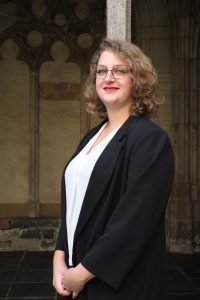Every morning, before stepping on the bus, I enjoy the sunshine and a cup of good, Italian coffee at Saxa Rubra station. Sitting outside in the sun, so different from the dark, gloomy days we usually see in the Netherlands this time of year, I am even more grateful to be here, in Italy, doing my internship at the Museo dell’Agro Veientano. With many thanks to helpful fellow KNIR guests, I have been able to figure out how to get to the museum and back (until the next time they unexpectedly change the schedule), though the websites almost makes one miss the simplicity of 9292.
Due to a stroke of genius from my mother, I arrived early at the KNIR, two weeks before I was supposed to start. If I had not, the internship could not have happened. So here I am, traveling to the beautiful town of Formello, which current Covid restrictions luckily allow, to finally be able to get some hands-on experience with Etruscan materials. Though this has been my field of study for a while now, it has been hard to find courses that focus solely on them. Now I am able to clean and piece together objects newly discovered in tombs and settlements near the museum (in a place called La Storta) and, furthermore, have the honour to work with Iefke van Kampen. As it turns out, I have had a book written by her lying on my desk for the past five years, the very one that got me interested in Etruscan culture. I will admit, when I figured this out, I was more than a bit starstruck. Doing an internship is busy and hectic, and Covid is still causing a lot of uncertainty, but I can say that being here has already proven to be one of the best and most valuable experiences of my academic career.
I am about a month and a half into my internship, which will last three months, and have slowly seen the KNIR empty of guests. My internship is fascinating and is teaching me a lot, but not being able to visit the museums and archaeological sites, which are everywhere, or go out with fellow students, does make it a bit lonely. Technology helps but is not the same as human contact. Hopefully the KNIR will soon be bustling again with students and fellows, being able to share their ideas. I have found that this is such an integral part of academia that we seem to have lost almost overnight due to Covid; sitting around, discussing our research over a cup of thee, and feeling lifted up and inspired by those around you. Yet, as I sip from my cappuccino, soaking up some much-needed vitamin D, I feel fortunate to be here and look forward to the vase-fragments waiting for me at the museum.
Lucy Visser
Internship at the civic museum in Formello (RM) in Spring 2020
The Museo dell’Agro Veientano is a regional museum principally focused on the archaeological heritage, founded in 1992 and in 2005 accepted in the Organizzazione Museale Regionale (OMR)of the Regio Lazio. In September 2016 an agreement was signed for cooperation with a series of civic and private museums in a larger area, creating the system of museums MANEAT, of which Formello is the leading museum.
The museum illustrates all phases of the history of the territory, starting from the Final Bronze Age, including the entire Iron Age with the rich necropoleis, the Etruscan period, Orientalizing and Archaic Age of the city of Veii, the Roman period, starting from the seizure of the town in 396 BC and comprising all phases after antiquity, until Baroque times.
The Museo dell’Agro Veientano may be found in the historical Palazzo Chigi, with building phases going from the 13th to the 17th c. and may be seen as the heir of the 17th c. Curiosity Cabinet Museo delle curiosità naturali, peregrine e antiche of Cardinal Flavio Chigi, which was housed here in the years around 1664.
After years of preparation, the museum reopened its doors in December 2016, with the display of materials going from the Bronze Age to Roman Republican time (room 1-4 on the first floor), and Roman Imperial age to Baroque Period (room 5 and 6 on the ground floor, opened In December 2018).
- handling of archaeological materials: register archaeological remains for museum display and storage, including first inventarisation of materials, updating of catalogue records and archaeological drawing of ceramics;
- museum mediation: communication of the museum contents to its visitors by means of guided tours, working on museum didactics and preparation of museum texts, both in English and Dutch;
- work on the Centro Info-Documentale (CID) of the museum with updating and data-entry of archaeological records according to ICCD standards;
- work on projects carried to be carried out within the new framework of MANEAT;
- work on temporary exhibitions.
Requirements:
- BA in archaeology with preferably a specialization in Medieval Italian Archaeology or Etruscology;
- good communication skills;
- fluent in English and at least basic knowledge of Italian;
- knowledge of the territory in and around Formello is an advantage.
Period: Spring 2020, c. 3 months (precise dates will be established by mutual agreement and availability of rooms at the KNIR)
More information:
museo@comune.formello.rm.it
KNIR offers: free accommodation at the KNIR; 70 euro per week and a compensation of 100 euro for travel costs.
Apply before January 15th 2020 by sending your cv, a copy of your BA diploma and a letter of motivation to secretary@knir.it.

